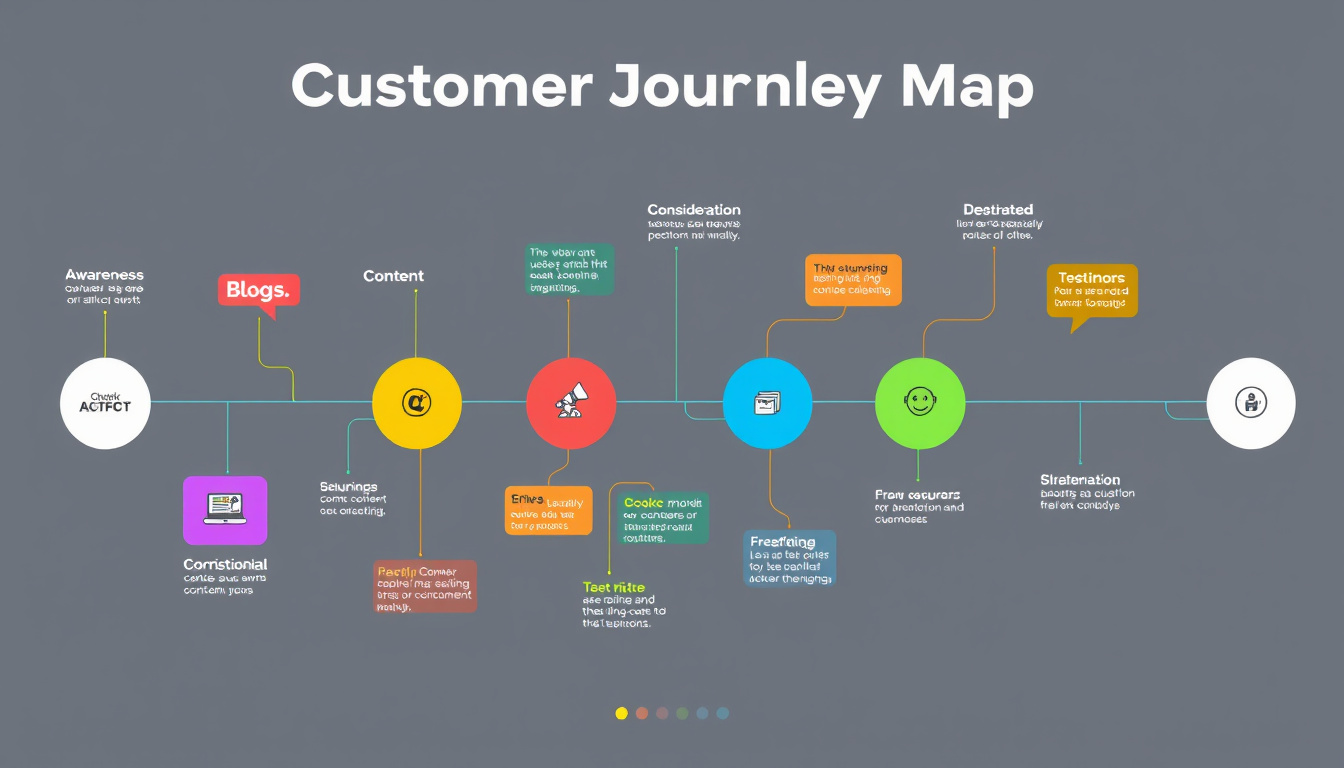📝 Measuring Content Marketing Effectiveness That Actually Convert

In today’s digital landscape, businesses are continuously seeking ways to enhance their visibility and drive conversions through strategic content marketing. Measuring content marketing effectiveness that actually converts is essential for understanding how your content resonates with your audience and contributes to your business goals. With the right metrics, analytics tools, and a clear alignment to the customer journey, businesses can refine their strategies to maximize the impact of their content. In this article, we will explore the key metrics and methodologies for measuring content marketing effectiveness, examine the role of analytics tools, and discuss how audience engagement can directly influence conversion rates. Let's delve into the fundamental aspects of creating content that not only engages but also converts.

Key Takeaways
- Understanding content marketing effectiveness is crucial for driving conversions.
- Key metrics like conversion rates and engagement levels are essential in measuring success.
- Analytics tools provide valuable insights for evaluating and refining content strategies.
- Audience engagement is a key indicator of how well content resonates with target customers.
- Aligning content with customer journey stages enhances its relevance and effectiveness.
1. Introduction to Content Marketing Effectiveness
Content marketing has become an essential component of modern marketing strategies, as businesses aim to connect with their audiences through valuable and relevant content. However, measuring content marketing effectiveness that actually converts can be a tricky endeavor. To truly grasp the impact of your content efforts, it is crucial to utilize specific metrics that align with your business goals. This includes tracking engagement levels, conversion rates, and overall ROI. By implementing a data-driven approach, marketers can gain insight into what content resonates with their audience, allowing them to refine their strategies for optimal performance. In this article, we will explore the various methods for measuring content marketing effectiveness, ensuring that your efforts not only reach but also convert your target audience.
2. Key Metrics for Measuring Conversion Success
When it comes to 📝 measuring content marketing effectiveness that actually convert, focusing on key metrics is essential for understanding your campaign's success. First and foremost, conversion rate is a critical metric; it indicates the percentage of visitors who complete a desired action, such as making a purchase or signing up for a newsletter. Another important metric to monitor is traffic sources, which helps identify where your audience is coming from and which channels are driving the most conversions. Additionally, analyzing engagement metrics, like time spent on page and bounce rate, offers insights into how well your content resonates with visitors. Finally, return on investment (ROI) should not be overlooked; calculating ROI gives you a clear picture of the financial effectiveness of your content marketing efforts. By closely tracking these metrics, businesses can refine their strategies and improve their overall content marketing effectiveness.
'What gets measured gets managed.' – Peter Drucker

3. The Role of Analytics Tools in Content Evaluation
In the realm of digital marketing, 📝 measuring content marketing effectiveness that actually converts is critical for ensuring that your strategies yield tangible results. Analytics tools play a pivotal role in this evaluation process by providing valuable insights into how your content performs across various channels. By utilizing metrics such as page views, bounce rates, and average time spent on a page, businesses can gain a comprehensive understanding of user engagement and behavior. These tools not only help in assessing the quantitative aspects of content but also allow marketers to delve into qualitative data, capturing audience sentiment through comments, shares, and interactions. Furthermore, integrating analytics tools with customer relationship management (CRM) systems can enhance personalization, enabling targeted content that resonates with specific audience segments. Ultimately, leveraging the right analytics tools is essential for refining content strategies, maximizing ROI, and ensuring that your marketing efforts are not just seen, but effectively convert readers into loyal customers.
4. Understanding Audience Engagement and Interaction
Understanding audience engagement and interaction is crucial when it comes to 📝 measuring content marketing effectiveness that actually converts. Successful content marketing isn't just about creating high-quality content; it’s about creating a dialogue with your audience. Engaging content invites feedback, inquiries, and participation, which can significantly enhance brand loyalty and conversion rates. By utilizing analytics tools, marketers can track metrics such as social shares, comments, time spent on page, and click-through rates. These insights help you identify what resonates with your audience, allowing you to refine your strategy and deliver more of what they want. Additionally, encouraging interaction through polls, questions, and interactive content can further enhance engagement, transforming passive readers into active participants. In this digital landscape, leveraging these interactions not only helps in gauging content effectiveness but also builds a community around your brand, leading to higher conversion rates.

5. Aligning Content with Customer Journey Stages
In today’s digital landscape, understanding how to effectively measure content marketing effectiveness that actually converts is crucial for businesses seeking to optimize their marketing strategies. One of the key components to achieving this is aligning your content with the different stages of the customer journey. Potential customers traverse a journey that includes awareness, consideration, and decision-making phases, and your content must cater to their needs at each of these stages. For instance, during the awareness stage, informative blog posts and engaging social media content can attract audiences and position your brand as a thought leader. At the consideration stage, detailed guides, webinars, and comparison articles serve to nurture leads by providing them with valuable insights to evaluate their options. Finally, in the decision stage, case studies and customer testimonials can help convert leads into customers by demonstrating the effectiveness of your solution. By strategically aligning content with customer journey stages, not only can you improve engagement rates, but also enhance your ability to measure the success and conversion rates of your content marketing efforts.
6. Case Studies: Successful Content Marketing Campaigns
When it comes to measuring content marketing effectiveness that actually converts, analyzing case studies of successful campaigns can provide invaluable insights. For instance, consider the content marketing strategy adopted by HubSpot, which leveraged educational blogs and free resources to attract new leads. By creating high-quality content that answered the specific questions and pain points of their target audience, HubSpot was able to convert readers into loyal customers. Another exemplary case is that of Airbnb, which utilized user-generated content and captivating storytelling in their marketing efforts. Their approach not only showcased available properties but also highlighted unique travel experiences, which significantly increased conversion rates by engaging their audience emotionally. These case studies illustrate that effective measurement is not solely about analytics and numbers; it’s also about understanding how compelling content resonates with your audience and drives them to take action.

7. Conclusion: Optimizing Future Content Strategies for Better Conversions
In conclusion, optimizing future content strategies for better conversions hinges on the effective measurement of content marketing effectiveness that actually convert. To ensure your content resonates with your audience and drives conversions, it's crucial to establish clear metrics and KPIs. By analyzing engagement rates, conversion paths, and audience demographics, marketers can refine their approach and create tailored content that not only attracts but retains customers. Utilizing A/B testing and leveraging analytics tools can further enhance these endeavors, enabling continuous improvement. Remember, the ultimate goal is to not just create compelling content but to facilitate measurable results that contribute to your overall marketing objectives.
Frequently Asked Questions
What is the importance of measuring content marketing effectiveness?
Measuring content marketing effectiveness is crucial as it helps marketers understand how well their content is working to engage audiences, generate leads, and drive conversions. By analyzing performance metrics, businesses can optimize their strategies to improve ROI and achieve marketing goals.
What key metrics should I focus on to measure content marketing conversions?
Key metrics for measuring content marketing conversions include conversion rate, click-through rate (CTR), engagement metrics (like time on page), lead generation (number of leads captured), and return on investment (ROI) for content marketing efforts.
How can analytics tools assist in evaluating content marketing success?
Analytics tools provide valuable insights into user behavior, traffic sources, and content performance. These tools help track metrics in real time, allowing marketers to assess which content resonates most with their audience and make data-driven adjustments to enhance effectiveness.
Why is understanding audience engagement important in content marketing?
Understanding audience engagement helps marketers gauge how well their content resonates with the target demographic. High engagement indicates that the content is relevant and appealing, which can lead to increased conversions and better alignment with audience preferences.
Can you provide examples of successful content marketing campaigns?
Yes, successful content marketing campaigns, such as Airbnb's localized content strategy or HubSpot's educational blog posts, illustrate how aligning content with audience needs and the customer journey can significantly enhance conversions and brand loyalty.
Authored by - Abdulla Basha
Email id - mail@abdullabasha.com
Linkedin